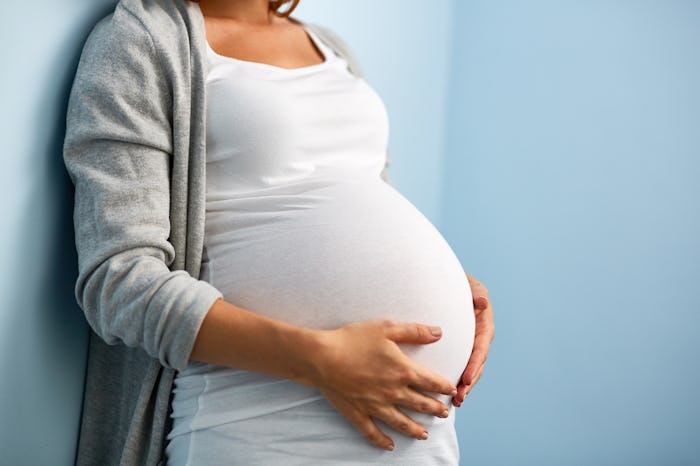Life
This Is The Body Part Most New Moms Are Insecure About, So Know You're Not Alone
It took me a while to get back into a regular exercise routine after I gave birth to my now-toddler son. I barely worked out during my pregnancy because, as a journalism graduate student, it was enough for me to carry around heavy video equipment while walking everywhere in New York City. But stress, new responsibilities, and mounting expenses made it hard for me to focus on working out for the first year postpartum. I felt unhappy with my body then, and it turns out, that's not unusual: New research shows that most new moms lack body confidence. Honestly, though, it shouldn't be that way.
Fitness site FitRated recently surveyed more than 1,000 women, and found that 65 percent of respondents were worried about their post-baby body weight, while less than half were worried about their postpartum mental health. There was one body part, in particular, that made the overwhelming majority of new moms surveyed feel the most insecure: Their stomach.
In numbers, that's 95 percent of women who reported concerns over their midsection after giving birth, according to FitRated's findings. Following the belly, breasts were the second-most prominent point of contention, with 43 percent of new moms reporting insecure feelings about their chest.
Carla Soto, creative team for FitRated, told Romper:
Women's confidence endures a lot, in general. From society's ideal beauty standards to the wage gap, there are constant messages that women are less than in many capacities.
Soto added:
That said, new moms experience a host of physical and physiological changes – mentally and physically – after giving birth. Not to mention, a new baby can mean a loss of time and focus on herself for herself. Those changes may breed new insecurities.
Of course, the findings of FitRated's survey aren't all that surprising. Talk to any parent, and they'll most likely tell you that their post-pregnancy body confidence was practically non-existent. I know after I gave birth, I didn't feel the best about myself, even though I knew my body was powerful beyond measure. (After all, I carried my son for nine months, while attending grad school, and now he is in the middle of destroying my living room.)
Anecdotal evidence aside, other research affirms the results of Fit Rated's survey. A 2009 study published in The Journal of Women's Health found that a mother's unhappiness with their body increased during the first nine months postpartum. The researchers behind the study also discovered that nine-month body dissatisfaction was often associated with a number of negative health outcomes, including disordered eating or a lack of appetite, fewer immediate family relationships, higher current weight, and mental health concerns.
But the truth is, losing the pregnancy weight is hard for most women. In a BabyCenter survey of nearly 7,000 new moms, nearly 60 percent of respondents weighed more than their pre-pregnancy size by their kid's first birthday. And 87 percent of women told BabyCenter that their stomach still hadn't returned to its pre-pregnancy shape.
Madelyn Fernstrom, director of the University of Pittsburgh Medical Center's weight management program, told BabyCenter:
For most people, the weight doesn't just melt off. Even the celebrities who lose the weight within three months have to work out regularly — usually for extended amounts of time measured in hours, not minutes, which means getting outside help with the baby – and diet to do it. It's hard for pretty much everyone.
Even though there are some new moms who do get into shape later on, that's not the case for every women. For many women, getting their pre-baby body "back" is not realistic within the first postpartum year. You are adjusting to being a new parent, with new responsibilities, taking care of this tiny life. Time is barely available to you.
In fact, 44 percent of women surveyed by FitRated reported they didn't have time after pregnancy to work out, while 24 percent said their job got in the way. It may take a year or two to even start a sustainable exercise routine.
I know that was the case for me. I am in the best shape of my life now, and at my lowest weight ever, but it took me nearly three years to get here after I gave birth to my son.
Pregnancy changes parents in so many ways, so it's not shocking that most moms surveyed would lack confidence in their new shape. With society's obsession with fitness and beauty, it just makes a lot sense. But what this FitRated survey shows, more than anything else, is that more work needs to be done to make sure new moms are confident in their new skin.
As Soto told Romper:
The goal, of course, is for women of all shapes and sizes to feel comfortable in their own skin, with or without a baby on the way.
For many women, there's no "going back" to the way it "used to be." So love the body you're in now.
Check out Romper's new video series, Bearing The Motherload, where disagreeing parents from different sides of an issue sit down with a mediator and talk about how to support (and not judge) each other’s parenting perspectives. New episodes air Mondays on Facebook.
